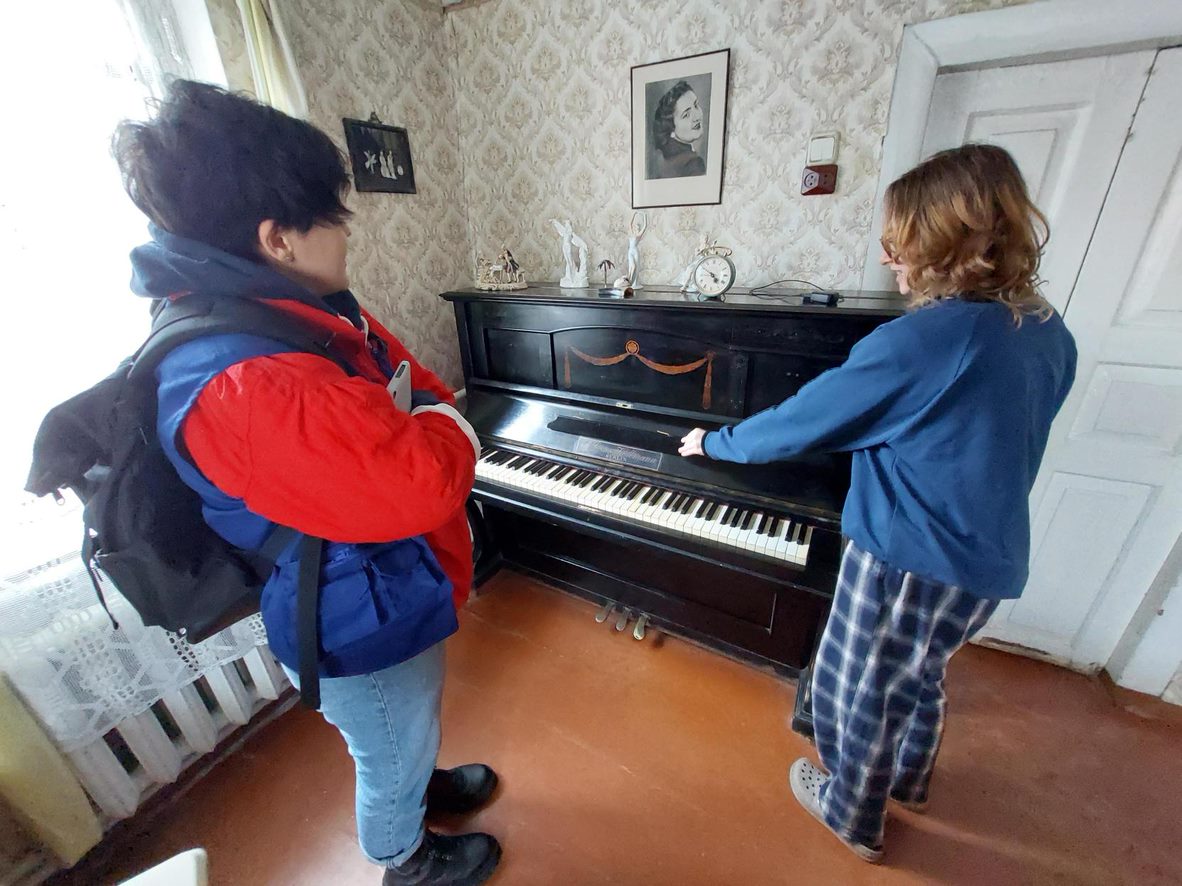Uzhhorod/Kharkiv, 22 May 2023 – “I fought for life because I have many plans,” says Maria* (pictured above), who survived the horror of the battle for Mariupol last year. In May 2022, she managed to reach Uzhhorod, the western Ukrainian region of Zakarpattia.
“I had dreams of seeing Uzhhorod again, my home city where I spent my childhood. And here I am! Fate favours those who are brave. So, we have to smile more and be thankful for this moment.”
Maria, now 81, left Uzhhorod many decades ago to pursue her studies. Eventually, she settled in the coastal city of Mariupol where she worked for Azovstal, a steel plant that became a symbol of resilience when families sheltered in the plant as a last stronghold during the Russian siege.
Her life was simple; she had a family and work she loved and living by the sea was a pleasure. Even when full-scale war erupted, Maria stayed put until the last possible moment. Her husband had died on the eve of the invasion, and she wanted to place a monument on his grave before leaving. She faced the darkness of the war by surviving in a small, cold basement, caring for her sick and weak neighbours, and burying friends in her own yard.
“I remember the day when the Russian troops arrived. The soldiers pointed their guns at us and gave us five minutes to gather our belongings. I helped my sick neighbours get out. I didn't take anything, even my ‘treasure’ – my dentures that were left in that basement,” she says, laughing.
Like thousands of other people, Maria had to leave Ukraine for a neighbouring country after the fall of Mariupol. With the help of volunteers, she was eventually able to return to Ukraine and reach Uzhhorod.
Having shared her story, Maria joined the queue to receive assistance delivered by the International Organization for Migration (IOM) to the ‘I am Mariupol’ community centre. She was provided free bedding, hygiene kits and a kitchen set. Her Mariupol is in ruins, but her internal strength is still intact. She has already started to think about how she can share the received aid with her neighbours and friends, arguing that “she does not need so much on her own.”
On the other side of Ukraine, in Kharkiv, Iryna Boksyan, a 96-year-old piano teacher, continues to tutor her neighbour’s daughter despite the challenges of the war. Iryna’s parents came to Ukraine as refugees from Türkiye in the 1920s, and she has steadfastly remained in Kharkiv even as Russian forces attacked the city in the winter of 2022.

Iryna speaking with the IOM monitoring team. Photo: IOM/Anhar Al-Rujaee
In her living room sits the antique piano which has kept her company during her years of living alone without family or relatives.
“I have students who I taught the piano all over the world; some of them are famous now. Despite my age, I’m still aware of the world around me. I hope I can get a phone or anything that would allow me to get in touch with my beloved students and feel connected to the world outside my house,” she says.
Her neighbour’s daughter, 15-year-old Ahnia Maria Portnova, has been taking piano lessons with Iryna since she was six years old. Ahnia has shared her performances online and with other musicians in Kharkiv, and she comes to play the piano for Iryna regularly. Although Iryna manages some tasks without assistance, Ahnia’s family has supported Iryna since a fall caused her to break her leg. With the challenges of leaving the house, staying home to listen to Ahnia playing piano is often the highlight of her week.

Ahnia (right) showing the piano that became a bond between generations – Iryna and herself. Photo: IOM/Anhar Al-Rujaee
A local partner of IOM brought Iryna bedding and hygiene kits, and a solar lamp so she could be more comfortable and safer during power outages which have become a regular occurrence since the start of the war.
There are approximately 860,000 elderly displaced people in Ukraine, and they are among the most vulnerable groups affected by the war. Helping them is a key priority for IOM. In particular, IOM Ukraine’s Common Pipeline Programme allows grassroots organizations in hard-to-reach areas to access essential humanitarian aid for their communities, while prioritizing those with the highest needs and greatest vulnerabilities. IOM assists its partners to identify and serve people like Maria and Iryna, ensuring that they receive the aid items, protection, health care, and mental-health support that they require.
* Name has been changed.
This story was written by Dariia Dovzhenko and Anhar Al-Rujaee from IOM Ukraine.


